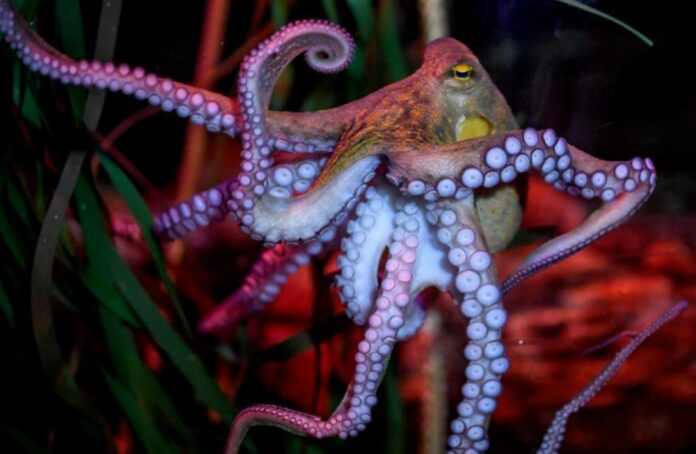Octopus finds it difficult to settle on a single-party trick. It swims by shooting jets of water at its enemies and can change its skin in secs to blend in with its environs.
A group of researchers from the University of Oregon is looking into this marine animal’s great eyesight, which is another thing that makes it stand out.
They have now published a report that provides a comprehensive map of the octopus’s visual system, identifying and naming the various neuronal populations that make up the visual cortex of the animal’s brain. The map serves as a resource for other neuroscientists by providing information that might direct future research. And it could tell us something about how brains and eyes have changed over time in general.
The findings were published in Current Biology today.
At the UO, Cris Niell has set up a facility to study vision, primarily in mice. But a postdoc Judit Pungor brought the California two-spot octopus to the lab a few years ago.
Even though cephalopods aren’t often employed as test subjects in laboratories, UO neuroscientists were immediately intrigued by this one. According to Niell, octopuses have an exceptional visual system and a significant portion of their brain is devoted to visual processing, in contrast to mice, which are not recognized for having good vision. They have an eye that is strikingly similar to the human eye, but their brains are entirely different from ours.
Octopuses and people shared a last common ancestor 500 million years ago, but since then, the two species have developed in vastly distinct environments. Therefore, it was unclear to scientists if the similarities in visual systems went beyond the eyes or whether the octopus used entirely distinct types of neurons and brain circuits to achieve the same effects.
“Seeing how the octopus eye convergently evolved similarly to ours,” according to first autor Mea Songco-Casey, “it’s cool to think about how the octopus visual system could be a model for understanding brain complexity more generally.
“For example, are there fundamental cell types that are required for this very intelligent, complex brain?”
Here, the team used genetic techniques to figure out what kinds of neurons are in the octopus’s optic lobe, which is the part of the brain that is responsible for seeing.
Based on the chemical signals that each type of neuron sends, they identified six major classes of neurons. Then, additional subtypes were discovered, offering hints at more precise responsibilities, when certain genes’ activity was examined in those neurons.
In some instances, the researchers were able to identify specific clusters of neurons in various spatial configurations, such as a ring of optic lobe neurons that communicate with one another by using the chemical octopamine. This molecule, which is similar to adrenaline, helps fruit flies see better when they are moving around. Therefore, it might play a similar purpose in octopuses.
“Now that we know there’s this very specific cell type, we can start to go in and figure out what it does,” Niell adds.
They found that about one-third of the neurons in the data didn’t appear to be mature. Over the course of the animal’s lifetime, the octopus brain continues to expand and add new neurons. These young neurons, which have not yet been incorporated into brain circuits, were an indication that the brain was developing.
However, contrary to what the researchers had anticipated, the map did not show any clusters of neurons that had clearly migrated from human or other mammalian brains.
“At the obvious level, the neurons don’t map onto each other—they’re using different neurotransmitters,” says Niell adding, “but maybe they’re doing the same kinds of computations, just in a different way.”
In order to dig deeper, it will be necessary to gain a greater understanding of cephalopod genetics. According to Gabby Coffing, a graduate student in Andrew Kern’s lab who worked on the project, many of the techniques that are used for precise genetic manipulation in fruit flies or mice don’t yet exist for the octopus because it hasn’t historically been utilized as a lab animal.
“There are a lot of genes where we have no idea what their function is, because we haven’t sequenced the genomes of a lot of cephalopods,” Pungor adds.
It is more difficult to determine the function of specific neurons without genetic information from related species to use as a reference.
The group led by Niell is up for the task. In order to see whether some of the genes they focused on in this study appear elsewhere in the brain, scientists are currently mapping the octopus brain beyond the optic lobe. In order to understand how the neurons in the optic lobe process the visual scene, they are also recording from these neurons.
Their work could eventually clear up some of the mystery surrounding these mysterious marine creatures and shed some light on how humans evolved.
Source: 10.1016/j.cub.2022.10.015
Image Credit: Britta Pedersen/picture alliance via Getty Images
You were reading: Scientists Just Revealed A Unique Feature Of Octopus Brain
